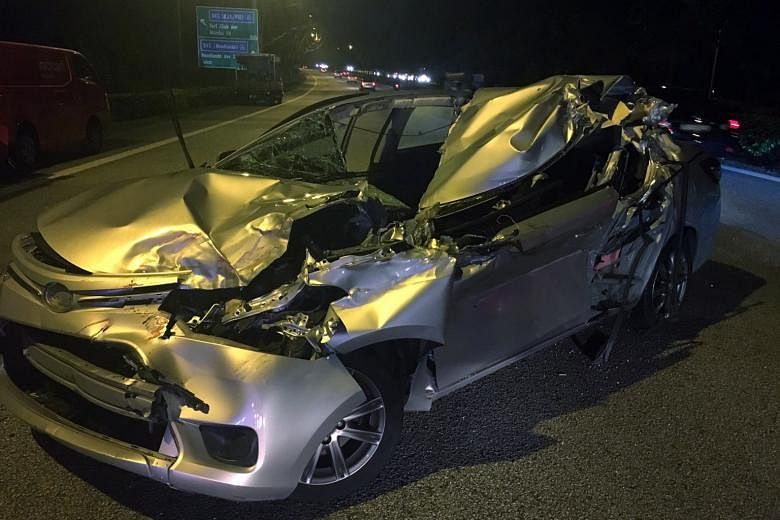The safety of private-hire car services has been thrown into the spotlight, in the wake of a fatal accident last Sunday involving an Uber vehicle.
The death of student Goh Pei Ling, 18, a passenger, has raised concerns about private drivers - they do not possess vocational licences or go through training - who ferry customers for fares.
Another question is whether private-hire cars are adequately insured to compensate passengers, or drivers, for injuries.
The Sept 25 accident took place along the Seletar Expressway when the Uber car that Miss Goh was travelling in crashed into a stationary lorry. A van was also involved. It is believed to be the first fatal accident involving a ride-hailing service here.

Last month, Uber suspended two of its drivers - one for allegedly driving drunk and harassing a female passenger, and the other for allowing another person to use his driver account to pick up customers.
Since Uber launched here in 2013, followed by rival GrabCar a year later, private-hire car services have been touted as the solution to commuters' woes during peak hours, when taxis can be hard to find.
But do recent events suggest that the convenience comes at a price?
One key issue is the driver. Private-hire drivers currently do not receive any formal training, unlike cabbies who go through a 25-hour classroom and self-study programme run by the taxi academy.
But this is set to change. By the first-half of next year, they will have to attend a 10-hour course when licensing of Uber and GrabCar drivers becomes mandatory. They will also undergo medical checks and background screenings and be subject to a demerit point system.

This should go some way to improve safety in the industry, where drivers can be as young as 21. In comparison, taxi drivers have to be at least 30 years old.
But as with the training for taxi drivers, it is unlikely that private-hire drivers will be put through any on-road assessment of their driving abilities.
The training for cabbies covers topics such as customer service, route knowledge, and rules and regulations.
A second issue is insurance and whether both drivers and passengers are covered.
Both Uber and GrabCar have said that they only allow cars which are commercially insured and registered to a company to be used, as required by the Land Transport Authority (LTA).
But assuming the checks are in place, there is still the worry that insurers could repudiate a victim's claims. What if, for example, the Uber or GrabCar driver did not pay his insurance premiums?
RHTLaw Taylor Wessing's insurance litigation partner, Mr Anthony Chey, said that the Motor Vehicles (Third-Party Risks and Compensation) Act is an "overriding law" that protects all injured victims.
When an insurer has repudiated liability due to breach of policy conditions, the insurer is still obliged to handle the victim's claim, he said.
"In a case where there is no valid insurance, the Motor Insurers' Bureau - an independent body funded by all motor insurers in Singapore - will compensate the victim," he said.
However, Mr Chey said that in any claims process - assuming the private-hire car driver is at fault - his or her identity has to be first established by the victims.
This may take time for Uber and Grab drivers, considering that private-hire drivers are known to their passengers only by the user names in the apps, he said.
However, when the licensing kicks in, these drivers will have to display their identification prominently in the car.
Still, it is difficult to ascertain factually whether private-hire car services are more or less safe than the taxi incumbents. Both Uber and GrabCar have been tight-lipped about accident rates. While taxi operators do not make public their accident numbers, they are accountable to LTA.
The authority sets a standard that there should be no more than 0.02 accident per 100,000km clocked each month, and the performance of each cab firm - in terms of a pass or fail grade - is put up on the LTA's website.
Anecdotally however, Uber drivers claim they are safer than cabbies because they do not have to fulfil LTA regulations like clocking a daily minimum mileage of 250km. When they are fatigued, they stop, they say.
But some users have countered that part-time Uber drivers hit the roads at night, after a long day at their day jobs and may not have their full concentration to bear at the wheel.
Last month, Traffic Police (TP) commander Sam Tee said that it sees taxi drivers as a "vulnerable group", because they spend many hours on the road.
TP has partnered with ComfortDelGro and SMRT to incorporate alerts into the data terminals of their taxis, to remind cabbies when they are approaching a red-light or speed camera.
Incidentally, Uber launched a tracking function in its app last month. Tapping the Global Positioning System capabilities of drivers' mobile devices, Uber will measure how hard they brake and how rapidly they accelerate, and submit daily reports to drivers on how to improve.
But this is not enough.
As the popularity of private-hire car services grows and they become a major part of the transportation landscape, it is vital for Uber and GrabCar to start opening up their accident records - if not to the public, then to the Government.
It's not about naming and shaming.
Instead, it will make for a frank assessment of whether safety is an issue in a new and lightly-regulated industry. Are Uber and GrabCar drivers "vulnerable" like cabbies, too?
Having the convenience of tapping an app to get a ride has radically changed the way we commute but it should not be at the price of safety and lives.
SEE FORUM



